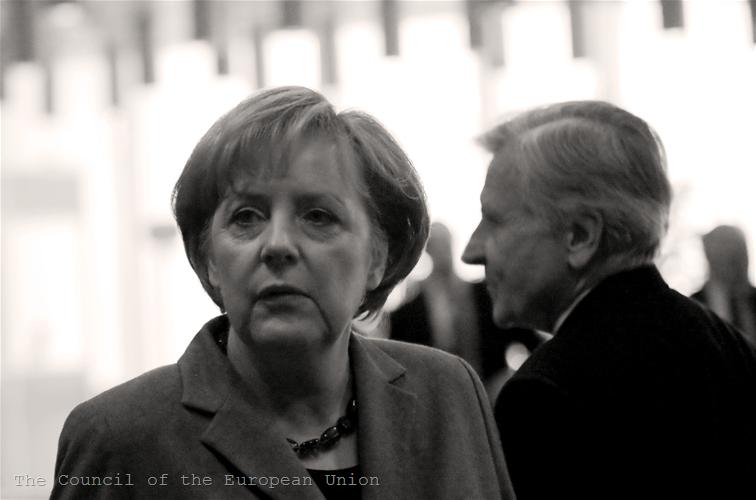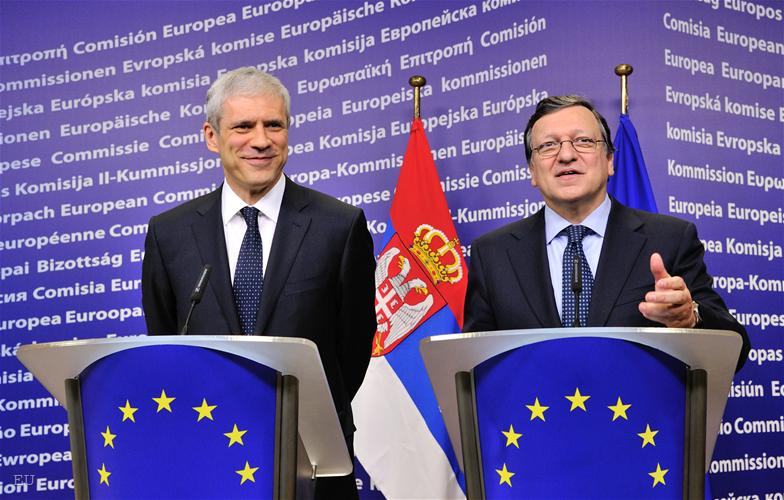Barroso Responds: Why Don't You Implement?
Adelina Marini, March 1, 2012
 Two days before the beginning of the Spring European Council Jose Manuel Barroso, European Commission president, responded to a letter of 12 member states from last week, in which they call on him and the president of the European Council for urgent actions a plan for growth for Europe to be developed. The letter contains 8 points which in essence are an appeal for completing the single market. Mr Barroso's answer is long, detailed and specific, but can be summarised in one word "implement". In the beginning he reminds the prime ministers of Britain, the Netherlands, Italy, Estonia, Latvia, Finland, Ireland, the Czech Republic, Spain, Slovakia, Sweden, Poland, who signed the letter, that the EU has been having a strategy for growth and employment for two years now - Europe 2020 - which needs to be implemented.
Two days before the beginning of the Spring European Council Jose Manuel Barroso, European Commission president, responded to a letter of 12 member states from last week, in which they call on him and the president of the European Council for urgent actions a plan for growth for Europe to be developed. The letter contains 8 points which in essence are an appeal for completing the single market. Mr Barroso's answer is long, detailed and specific, but can be summarised in one word "implement". In the beginning he reminds the prime ministers of Britain, the Netherlands, Italy, Estonia, Latvia, Finland, Ireland, the Czech Republic, Spain, Slovakia, Sweden, Poland, who signed the letter, that the EU has been having a strategy for growth and employment for two years now - Europe 2020 - which needs to be implemented.
To avoid claptrap, President Barroso answers very thoroughly all the issues raised in the letter. Regarding the single market the Commission will come up with a communication by the summer European Council in June, in which it will make recommendations how better to be used the existing tools to improve and monitor the implementation of the single market. One of the very painful issues of the single market is being raised in the letter and that is its fourth pillar - the free movement of services. Since 2006 the Services Directive is enacted but its implementation is not  comprehensive. This is why the Commission will come up with a report, in which it will assess the quality of implementation of the directive in all member states - from economic and legal perspective.
comprehensive. This is why the Commission will come up with a report, in which it will assess the quality of implementation of the directive in all member states - from economic and legal perspective.
Moreover, an assessment will be made on how the directive works in three key sectors: tourism, construction and business services in order to see how the different EU legislation is being implemented on the ground.
As regards the digital internal market, which is mentioned under point two in the letter of the Twelve, Barroso recalls the Action Plan for e-Commerce, which the Commission presented on the 11th of January 2012 and which outlines the potential of online services for growth and jobs. The purpose of this plan is e-commerce to be doubled by 2015 because it hides big opportunities for jobs creation and for economic growth. If 15% of the sales were taking place online and the hurdles of the internal market were removed, the Commission estimates that this would bring benefits for the consumers worth 204 bn euros, which is 1.7% of the European gross domestic product. Besides, the internet economy creates 2.6 jobs for every one lost offline.
Also for the June European Council it is envisaged the Commission to propose collective management of copyright, aimed at boosting the implementation of simplified multi territory licensing. Again in January the Commission presented a Green Paper which describes the current situation of card, internet and mobile payments across Europe. On the basis of this book and the ongoing consultations, in April the Commission will announce its next steps.
In fact, the list of initiatives of the Commission is impressive in their part concerning the building of a digital single market. Much more detailed than what the 12 prime ministers raise in their letter, while most of them represent countries with very well developed e-services and government.
One of the very sensitive points in the letter is the issue of the single energy market. In this point the countries insist for a quick and overall implementation of the Third Energy Package. Again in June this year the Commission promises to publish a communication about the situation of the energy market - liberalisation, integration - as well as to announce new initiatives, aimed at adjusting the market architecture and to improve efficiency of distribution systems. In his answer, President Barroso recalls that the Commission had recently referred several EU member states to the European Court of Justice for not fulfilling the conditions for ensuring access to their distributing gas networks.
8 are those that had not transposed the directives for electricity and natural gas from the Third Energy Package, which had to do that by March 3, 2011. A year later the Commission refers them to the court. Those are Bulgaria, Cyprus, Spain, Luxembourg, the Netherlands, Romania and Slovakia, which had also failed to inform EU's executive of the measures they had undertaken to transpose those directives.
 Very detailed is the Commission's response regarding the issue from the letter of the 12 about the external dimension of growth, namely the EU trade relations with its strategic partners. It is recalled that the EU has concluded the negotiations with Ukraine on a Deep and Comprehensive Free Trade Area (DCFTA), together with an Association Agreement. This is the first agreement of this kind, concluded with an Eastern Partnership country, although the political situation in Ukraine at the moment is holding back the process of initiation and ratification of the agreement, as it became clear at the regular EU-Ukraine summit in December. Green light has been given for a start of negotiations on similar agreements with Moldova and Georgia, and since very recently with Armenia as well.
Very detailed is the Commission's response regarding the issue from the letter of the 12 about the external dimension of growth, namely the EU trade relations with its strategic partners. It is recalled that the EU has concluded the negotiations with Ukraine on a Deep and Comprehensive Free Trade Area (DCFTA), together with an Association Agreement. This is the first agreement of this kind, concluded with an Eastern Partnership country, although the political situation in Ukraine at the moment is holding back the process of initiation and ratification of the agreement, as it became clear at the regular EU-Ukraine summit in December. Green light has been given for a start of negotiations on similar agreements with Moldova and Georgia, and since very recently with Armenia as well.
There is a high probability the negotiations with Singapore to be concluded in the first half of this year, and it is also possible the negotiations with Malaysia to be concluded too. Last year the first trade agreement with South Korea entered into force, which is already delivering first results. The end of the negotiations with India is also near.
Regarding another painful common European issue - youth unemployment - in his response Mr Barroso writes that after the January European Council, when the topic was discussed concretely, teams have already been gathered to identify specific practical steps to reduce youth unemployment, including through financial assistance from the EU budget. It is recalled that the Commission recently presented a White Paper on Pensions in which it outlines the priorities for ensuring adequate and sustainable pension systems. And in December an amendment was proposed to the directive for professional qualifications, which includes the introduction of a European professional card, the purpose of which is to facilitate mobility of professionals across the EU.
In conclusion in his letter Jose Manuel Barroso points out that the Commission has made a lot of proposals which now have to be implemented on the ground. By the way, he made such an appeal back in the beginning of the autumn season. And at a news conference on the occasion of the European Council that starts tonight, the Commission chief again said that economic growth would be his main message for the leaders. He expressed hope, with an inscrutable smile, that the drama at this council would be less than usual but he insured himself saying that this might not happen, but "a little drama won't do any harm". Given what German Finance Minister Wolfgang Schaeuble said, quoted by Reuters, this Council indeed would be deprived of a drama.
Schaeuble said, regarding the expectations on Thursday and Friday the combining of the resources of the temporary eurozone rescue fund EFSF with the permanent European Stability Mechanism (ESM) to be discussed, that would lead to a combined lending capacity of 750 bn euros. About such a move also called the G20 countries, which want to see a serious financial contribution on behalf of the eurozone before agreeing to increase their resources in the IMF, through which to take part in the bailout  operations of the zone of the euro. According to Schaeuble, however, when it is said that this issue will be discussed in March, this means throughout the entire March.
operations of the zone of the euro. According to Schaeuble, however, when it is said that this issue will be discussed in March, this means throughout the entire March.
Similar wording used Jose Manuel Barroso too, saying: "Look, it is still February, and tomorrow is only March 1st. More than 30 days remain". In the framework of these 30 days the eurozone countries have to decide whether they will respond to Germany's proposal. Berlin intends to invest half of its contribution to the combined fund this year and expected the other countries to give "as much as possible, as soon as possible".
Eurogroup President Jean-Claude Juncker confirmed that a decision on the issue was unlikely to be taken at the summit. He explained that the capacity of the rescue fund depended on the speed with which the countries pay their contributions. The proposal is, instead in five tranches, they do that in two, following Germany's example. But there are countries which are still not ready to accept the proposal. Every tranche increased the capacity of the fund by 100 bn euros, Jean-Claude Juncker said before the economic committee of the European Parliament. So, there are symptoms of a drama but its main act on the issue might take place after the council. The Eurogroup president said he was confident that there would be a happy end.
 | © The Council of the European Union
| © The Council of the European Union | © The Council of the European Union
| © The Council of the European Union | © EU
| © EU